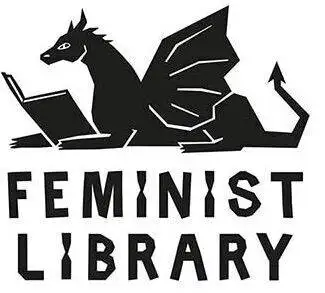Review – Feminist Library’s Latinx Feminist Festival
Feminist Library’s Latinx Feminist Festival – celebrating Latin culture and diaspora feminisms
Review by Jael de la Luz and Emma Thatcher
During Autumn 2017 we organised the Latinx Feminist Festival, a series of events including films, poetry and a local history walk, to make visible and celebrate the Latin American community in London.
Interest in the event first arose when we located in our collection Latin American and Chicano writers translated into English, and collective books that drew on the experience of women in times of revolutionary changes in Cuba, Mexico, El Salvador, Nicaragua, Colombia and the Caribbean.
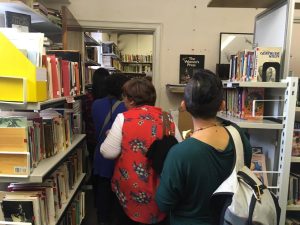 The Feminist Library is located close to Elephant and Castle, which has a large Latin American community currently struggling to preserve their spaces in the face of gentrification. This is something the Library has also experienced, and we wanted to make connections with other local groups and campaigns, and celebrate the local histories that exist here within Southwark.
The Feminist Library is located close to Elephant and Castle, which has a large Latin American community currently struggling to preserve their spaces in the face of gentrification. This is something the Library has also experienced, and we wanted to make connections with other local groups and campaigns, and celebrate the local histories that exist here within Southwark.
Thanks to opportune funding by Oscar Murillo supporting this project, we were able to make the plan a reality! We set about planning a series of events and named the project the ‘Latinx Feminist Festival’, the ‘x’ challenging the gendered nature of the Spanish language.
We launched the festival with a tour of the Library in Spanish and Portuguese. We spoke about fanzine culture, and referred to books and authors that we have, such as the Chicana, lesbian and queer feminist, Gloria Anzaldúa and Chicano fiction writer and poet, Sandra Cisneros. We also spoke about Elena Poniatowska, a Mexican writer and essayist who has a book about Tina Modotti, an Italian woman photographer exiled in Mexico.
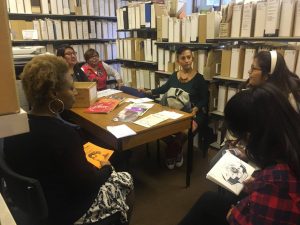 Our discussion of Latin American Feminisms in the Diaspora allowed us to link to British writers and the act of writing, as well as exploring the identity that brings us closer to or separates us from other feminisms. A space for conviviality was made for us to share Brazilian food and we continued the afternoon with poetry. Two poets performed, firstly Calu Lema, who is part of Naked Journeys, Meditation and Movement, made a rap interpretation about the importance of consent and how to stop violence, especially if it is sexual harassment. The other participation was by a Chilean woman who mixed Spanish with English in her responses and anarchist poetry, thinking about the anger of recognising the effects of migration in her life. Others participated in an open mic.
Our discussion of Latin American Feminisms in the Diaspora allowed us to link to British writers and the act of writing, as well as exploring the identity that brings us closer to or separates us from other feminisms. A space for conviviality was made for us to share Brazilian food and we continued the afternoon with poetry. Two poets performed, firstly Calu Lema, who is part of Naked Journeys, Meditation and Movement, made a rap interpretation about the importance of consent and how to stop violence, especially if it is sexual harassment. The other participation was by a Chilean woman who mixed Spanish with English in her responses and anarchist poetry, thinking about the anger of recognising the effects of migration in her life. Others participated in an open mic.
On two other days we had film screenings. The first film was 25 De Julho-o Filme/ Feminismo Negro Contado Em Primeira Pessoa, a Brazilian documentary about black feminism. It showed how intersectional Afro-Brazilian feminists struggle against colonialism, sexism, racism and classism within their own country and give alternatives, using art and education to change those stereotypes.
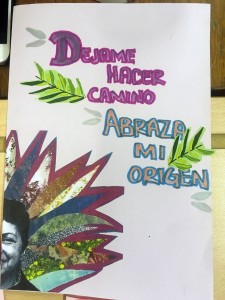 The other screening was La Teta Asustada (The Milk of Sorrow), a Peruvian film that allowed us to discuss the reality of hundreds of women who have experienced violence and civil war in Latin American countries, and how their bodies have become a field of physical and symbolic battles. It looks at the idea of trauma and defence mechanisms that women have created since pre-colonial times to resist total invasion and sexual violations.
The other screening was La Teta Asustada (The Milk of Sorrow), a Peruvian film that allowed us to discuss the reality of hundreds of women who have experienced violence and civil war in Latin American countries, and how their bodies have become a field of physical and symbolic battles. It looks at the idea of trauma and defence mechanisms that women have created since pre-colonial times to resist total invasion and sexual violations.
Another Saturday we spent the afternoon creating fanzines and crafts, and talked about iconic women in Latin American and feminist culture. This included Mexican painter Frida Kahlo, Afro-Colombian politician Piedad Córdoba, the Oaxacan Mexican rapper Mare Lyric Warning, the Chicana singer Selena, and goddesses of the Andean traditions.
The festival ended with a guided walk through Southwark and Lambeth that aimed to connect the history of British women in the arts, culture and the workplace with the current struggles of migrant women and the Latin American community.
At Elephant & Castle we discussed the history of the Latin American community in South London and the gentrification of the area. We looked at historical landmarks – the Metropolitan Tabernacle, spirituality and its visit by the Fisk Jubilee singers. Walking on to the Imperial War Museum we visited the Peace Garden, opened by the Dalai Lama in 1999, and talked about peace and conflict affecting migration and the women’s peace movement.
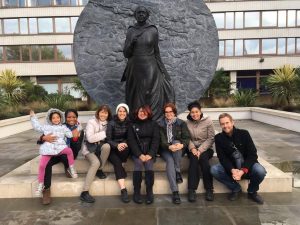 Stopping by Morley College we learnt about its importance in local women’s education. As Virginia Woolf was a tutor there between 1905-07, we talked about A Room of Ones Own, the necessity of economic and social independence for women, and the challenges faced by migrant women in London.
Stopping by Morley College we learnt about its importance in local women’s education. As Virginia Woolf was a tutor there between 1905-07, we talked about A Room of Ones Own, the necessity of economic and social independence for women, and the challenges faced by migrant women in London.
Moving on to St Thomas’ Hospital we visited the Florence Nightingale museum and the statue of Mary Seacole, and considered the traditional caring roles of women.
We had some great feedback from participants in the Latinx Feminist Festival, who spoke about how much they enjoyed the events and about the importance of celebrating Latinx history and culture. Future plans to continue the project include the possibility of a language exchange for Spanish, Portuguese and English speakers, and the idea of a book club. Watch this space!
